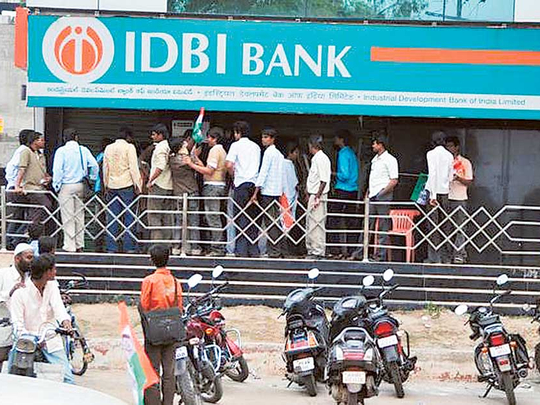
Dubai: State-owned IDBI Bank Ltd is open to sell minority stake to institutional investors or sell some of its non-core assets to raise funds up to Rs60 billion (Dh3.3 billion) during the current financial year, Kishor Piraji Kharat, Chief Executive Officer and Managing Director at IDBI Bank told Gulf News in an interview.
|
|
Kishor Piraji Kharat IDBI bank |
“During the current financial year we have a plan to raise Rs60 billion in capital. Out of that we have the shareholders’ approval until August to raise Rs37.70 billion. If we don’t meet that deadline we will go back to our shareholders and extend that permission. We also have the option to monetise our non-core assets to raise capital,” said Kharat.
Contrary to the media reports in India, Kharat said the bank is in no hurry to sell stakes or assets to meet capital requirements.
“Right now there is no pressing need for me to go to the capital market to raise capital. Currently our capital position is 2 percentage points above the Basel II requirements. Additional capital requirements are directly linked to our business plan,” he said.
Earlier this year the government has initiated a process to sell a minority stake in IDBI Bank, which unlike other state-owned banks, is governed by a separate legislation that allows the government to reduce its stake to below 51 per cent without requiring parliament approval.
The process was kicked off in March after Union finance minister Arun Jaitley’s budget speech where he announced the government’s intention to bring down its stake in IDBI Bank from the current 91 per cent.
As part of the plan, the government is looking at selling stake to one or more strategic investors. But the bank is looking for investors who can accept its business model rooted in longer term development financing.
“We are anticipating that there will be some multilateral agency on-board soon. In any case those who come on board should be ideally in the business of long term development financing,” Kharat said.
The bank is not averse to selling stake to long term institutional investors such as sovereign wealth funds or government related entities as long as these investors have a commitment to development finance.
Investors, including International Finance Corp, the investment arm of the World Bank, and CDC Group, the development finance institution of the UK government, are understood to be in talks with the government to buy stake in the bank.
Some of these global institutions are already doing their due diligence for potential stake acquisition. Kharat said valuation will be a key factor in making a decision on both stake sale and monetisation of non-core assets.
IDBI Bank, at present, has a market capitalisation of just over Rs130 billion. Selling non-core assets is one way for the bank to shore up its capital position and strengthen its balance sheet in the short- term.
IDBI Bank had raised Rs4.5 billion by selling some of its non-core holdings during the year ended 31 March. The bank has been able to monetise a part of its stake in the National Stock Exchange and CARE Ratings Ltd so far.
As of March 31, 2016 IDBI Bank’s non-core assets consists of shareholdings in companies such as National Stock Exchange (3 per cent), Small Industries Development Bank of India (19.2 per cent), National Securities Depository Ltd (30 per cent), Asset Reconstruction Company (19.2 per cent) in addition to unspecified holdings in companies such as Stock Holding Corp of India, Exim Bank and North Eastern Development Finance Corporation.
Earlier this month the bank reported that its total non per forming assets (NPA) rose to 10.98 per cent of total loans as compared to 8.94 per cent in the previous quarter. The bank reported a net loss of Rs17.36 billion for the quarter ended 31 March as provisions rose to account for the increase in bad loans. For the full fiscal 2015-16, the bank registered a net loss of Rs36.65 billion as against a net profit of Rs8.73 billion in 2014-15.
“Our NPLs, if you look closely are good at the ground level. There are cash flow issues with most businesses. Technically cash flow was not sufficient to make the payment obligations therefore many of these entities were defaulting on their obligations. The moment cash flows improve these assets will no longer be NPLs,” said Kharat.











